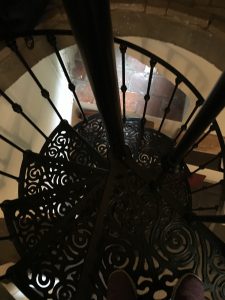Remember 20 Questions? It was one of those “keep the kids busy during long car rides” games that has faded into memory as children stare at movies on tablets or play games on phones to kill time.
I’ve revived 20 questions as part of my strategy as a volunteer in an English as a second language program that is based on a one-on-one conversation model. I started using it with my first conversation partner/student when I realized that she was prompting me to be the dominant speaker in our conversations and I was working hard to switch roles. As I was the person answering YES or NO in the game, she was forced to be verbose in comparison.
Inevitably, the end of a game of 20 questions would prompt a natural back & forth conversation about the object of the game—the mysterious person, place or thing. This is when I learned what she did and didn’t know about the history of her adopted country, and other topics that we could explore together.
I played a few round of 20 questions with my current conversation partner and it prompted an interesting discussion about what questions people ask of new acquaintances, and why they choose those questions. In many instances, it’s cultural.
Is it OK in a particular social or business setting to ask a stranger about work? Sometimes it’s the logical first question, sometimes, it feels rude and intrusive. In social dance circles, it’s easy to dance with a relative stranger for years before learning that he’s a lawyer or a train conductor or a research scientist. One of the great pleasures is the “leveling” that occurs when you don’t know, don’t ask, and don’t even care what the other person does for a living.
In real estate obsessed NYC, my student (a real estate agent) locked on to “where do you live?” as the most popular question. I asked him why he thought it was a common first question and he said it was all about status. Where you live communicates a great deal to the other New Yorkers. Although I pointed out to him that we were in a city where people of disparate financial backgrounds can live in the same building, he’s right in the general sense of LOCATION and STATUS being connected. He then laughed and said that in Russia you ask what people they drive and that reveals, status too.
I think that the choice of question reveals as much about the questioner as it does about the person being queried. Good to know when writing detective fiction!

A spiral staircase in Amsterdam. Questions reveal as much about the inquisitor as about the queried.





Not being a wildly gregarious person, I can’t think of the last time I met someone in a ‘blank’ context and had to make small talk like that. You’re right though, jobs and real estate do say a lot about a person, but not necessarily in a good way. Some of the nicest people I know live in poorer neighbourhoods, while some sales people I’ve met are actually really nice.
Then again, maybe confounding expectations is exactly what mystery fiction is all about?
Confounding expectations is at the heart of all good storytelling!
I found my student’s choices of questions—even in the game of 20 Questions—to be very revealing. We talked a great deal about how he chose his questions, why and how he could develop a more successful strategy for the next time we play 20 Questions.
In the dialog in a work of fiction, the natural back & forth of a conversation usually has a subtext. The author needs to reveal a clue in a mystery, forward the story with a quick move from one idea to another, or simply explain the backstory of a character. Imagine two characters in adjacent seats on a train. A little nod and smile, acknowledging the other person and one (someone like me) buries herself in her Kindle (or newspaper or book or magazine), but a gregarious seatmate might inquire, “Where are you going? I’m going to Wilmington.” I’d feel obligated to reply that I was going to Washington DC. “Visiting friends or business?” I might start to think the person was nosy, or just inquisitive, or lonely, or maybe flirtatious… The character based on me would have to make a judgement about how much to say in reply… I could, tell them the truth. “I’m going to visit old friends. We’ll go to National Gallery and the Smithsonian Museums…” OR the character could weave a completely erroneous story. That lie, could come back to haunt the character who was just telling a story about being on an assignment for a national magazine OR might serve to cover her real purpose, for instance uncovering a double agent in the CIA.
Talk about the power of the right/wrong questions and the right/wrong answers!